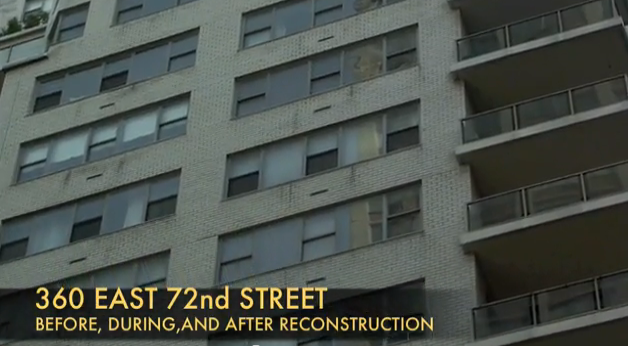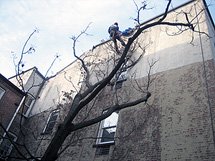HABITAT
Today Habitat introduces "Teachable Moments," an occasional feature in which leading management professionals offer quick takes on various topics of interest to co-op and condo board members. In the first of this series, four industry veterans give mini-lessons on how to find creative solutions to problems that resist the usual approaches.
Court Tells Board in Foreclosure Case: The Guy Paid. What Else You Want?
Written by Frank Lovece on July 20, 2012
The Clinton West condominium at 516 W. 47th Street, in the neighborhood you call either Clinton or Hell's Kitchen depending on how New York you are, seems a nice place to live. Built in 2003, the seven-story, two-building complex of about 80 apartments boasts granite kitchen counters, heated bathroom floors, an atrium lounge with WiFi, a fitness room and even a putting green. Behind this genteel façade, however, a battle brewed.
Edward Desmond of apartment S3G is a union electrician who since 2010 has been unemployed. That year, he fell behind on his common charges and notified the property manager — first Steven Katz of Rudd Realty, later his successor, Ellen Marrone of Midboro Management. As Desmond testified in court, Marrone reasonably and appropriately told him that if Desmond were to begin making his current payments, "it would be a show of good faith."
It was one of the last reasonable things anybody did.
When Condo Unit-Owners in Arrears Try to Hide Apartment Ownership
Written by Frank Lovece on August 30, 2013
It's hard enough for condominium associations to go after unit-owners in arrears for their common charges. It's even harder when the unit-owner "gives away" the apartment to somebody outside the country who moves around and doesn't give a forwarding address. And since courts don't recognize it when you serve court papers to the "former" unit-owner — who still lives there — what can a condo board do? Are you out of luck? Is this the magic-trick loophole, the get-out-of-jail-free card, that prevents a board from taking someone in arrears to court?
Maybe so, at least judging from a case still in its early stages involving The Spencer condominium in the Lenox Hill neighborhood of the Upper East Side.
Recent news affecting co-op / condo buyers, sellers, boards and residents. This week, the Attorney General brings down the hammer on a real estate attorney we hope wasn't yours, Hell's Kitchen residents want a homeless woman to get the hell away, a family feuds over a Park Avenue co-op, and we've an update on that Florida condo where faith-based discrimination against unmarried straight and gay couples made national headlines. Plus, for condo and co-op boards, we've the latest on the City Council bill for regulating co-op admissions.
Habitat 101: Financing a Co-op Restoration
August 22, 2013
Aug. 22, 2013 — The co-op board president and two building managers of the monumental 360 E. 72nd Street, between First and Second Avenues, tell how they swung a refinancing that paid for an $8.5 million refacing from white-brick to red-brick, plus $3 million dollars in additional upgrades -- not only without raising shareholders' monthly maintenance, but putting $12 million into the co-op's reserve fund.
“The building is solid,” says Larry Hohlt, the retired lawyer who also heads up the nine-member board at what he calls a “classic prewar” — this 107-unit East Village co-op.
For proof, he points to a worker who tried to drill through a wall – only to break his drill bit on the brick that lay beneath the surface. “They built these buildings very, very well,” he says of the Depression-era property. “The building aged gracefully.”
Meeting Minutes: How Much Detail Goes In? To Whom Should Minutes Go Out?
Written by JennIfer V. Hughes on March 27, 2012
When a prospective buyer wants to view the minutes of a condo or co-op board before purchasing an apartment, it's important to take the request the seriously. "If the board declines," says David L. Berkey, a partner at Gallet Dreyer & Berkey, "I think that can detract from the saleability of the apartment or may affect the pricing,"
Most boards release an edited version of minutes, or a summary, that leaves out specific details on a variety of topics, such as financial issues, potential litigation, and debates over purchases and contracts before they are made. Very few boards go to the other extremes: detailing and releasing everything from the meeting in their minutes or releasing nothing at all.
How My Co-op Board Created a 10-Year Capital-Improvement Plan That Works
Written by Larry Hohlt, board president, 40-50 E. 10th Street, Manhattan on April 11, 2013
My wife and I lived in a house in Brooklyn Heights for almost 30 years before moving to 40-50 E. 10th Street nearly 12 years ago. It's a great building, with a wide range of residents, a healthy assortment of children. Old-world charm and new-world amenities: two private gardens and a cardiovascular exercise room. It is also walking distance to both the East and West Village. To keep the property sound and attractive, two years ago the co-op board created a 10-year capital plan.
Board Service: Jo Anna Isaak and Dan O'Connell on a Co-op's Tree Removal
Written by Jo Anna Isaak and Dan O'Connell, President and Shareholder, 329 W. 21st Street, Manhattan. One in an occasional series of real-life stories by board members about serving on co-op and condo boards. on August 18, 2011
When we purchased our small co-op apartment in Chelsea more than 20 years ago, the biggest appeal to us was the deck and garden area that came with it. Hidden behind the main 10-unit building, the dominant feature of the small courtyard was a large, old ailanthus tree. It attracted rare and unusual birds, resting on their migratory paths. It gave us shade in the summer and leaves to sweep in the fall. Its only downside, we thought, was that we had to scoot around its massive, elephantine trunk when bringing food from the building to our outside dining table.
For 20 years, we enjoyed our tree. Then, one day last winter, we noticed something peculiar: The tree's roots were breaking through the ground, coming up and pulling our wooden deck up with them.
This week, the co-op board of the publicly subsidized Lindsay Park Houses in Williamsburg, Brooklyn, used taxpayer money to send letters endorsing disgraced former Assemblyman Vito Lopez, who — despite sexual-harassment charges by eight women and having to resign following a state Ethics Commission investigation — is running for City Council. But it seems that's legal — as is, apparently, a Florida condominium board's refusal to sell to unmarried straight or gay couples "living in sin"… and since gays can't marry in Florida, that point's especially problematic. We don't usually note news outside the metro area, but real-estate discrimination against those who don't share your religious beliefs seems more than parochially important. And in other news: Parents like playrooms as an amenity!




 View video now...
View video now...




